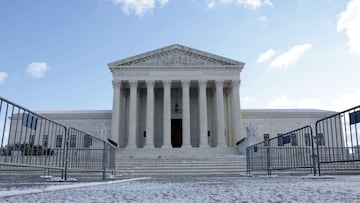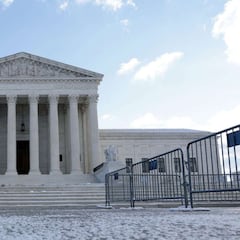What did the Supreme Court decide about Biden's vaccine mandates?
The Supreme Court will issue its decision on vaccine mandates, upholding certain requirements for healthcare workers while striking down for businesses


The Supreme Court of the United States released two opinions on Thursday 13 January regarding President Biden's use of executive power to implement vaccine mandates on healthcare and private-sector workers. While the case presented for healthcare workers was upheld, meaning that workers in facilities that receive funding for Medicare and Medicaid will be required to receive a vaccine, the broader mandate for private businesses was struck down.
Healthcare workers in Biden VS Missouri
Psaki says WH will continue calling on employers to institute vaccine requirements despite SCOTUS ruling striking down OSHA rule.
— Courtney Subramanian (@cmsub) January 13, 2022
Related stories
The three more liberal justices, Breyer, Kagan, and Sotomayor were joined by Justice Kavanaugh and Chief Justice John Roberts to uphold the order that the Department of Health and Human Services mandate all "participating facilities" who receive funding from the federal government "ensure that their staff—unless exempt for medical or religious reasons—are vaccinated against COVID–19."
Justices Alito, Barrett, Gorsuch, and Thomas dissented arguing that "the Government has not made a strong showing that it has statutory authority to issue the rule." Justice Thoms who authored the dissenting opinion states that it is his view that Congress did not provide the Center on Medicare and Medicaid sweeping authority to implement such a mandate, and thus the government failed to present a case worthy of being upheld.
Private sector workers in NFIB VS Occupational Saftey and Health Administration (OSHA)
The second case, brought by the National Federation of Independent Business, related to vaccine mandates on private businesses. Justices Alito, Barratt, Gorsuch, Kavanaugh, Roberts, and Thomas formed the majority and issued an opinion that "Although Congress has indisputably given OSHA the power to regulate occupational dangers, it has not given that agency the power to regulate public health more broadly."
Had the mandate gone into effect on 9 February, the Biden administration estimated that it would have caused an additional twenty-two million people to get vaccinated. The decision targets the majority's opinion, saying "And then, there is this Court. Its Members are elected by, and accountable to, no one. And we "“lack[] the background, competence, and expertise to assess" workplace health and safety issues," adding "When we are wise, we know enough to defer on matters like this one. When we are wise, we know not to displace the judgments of experts, acting within the sphere Congress marked out and under Presidential control, to deal with emergency conditions. Today, we are not wise."
What's next?
It is up to Congress. Should they choose to give OSHA more explicit control to enact these sorts of mandates, the Court would have to uphold them. This path, however, seems unlikely as no such legislation has been put forward.

